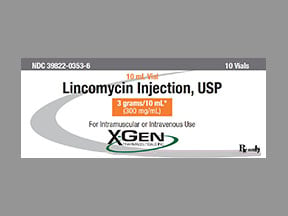
Lincomycin Coupons & Savings Card – Discount Prices from $28.88
Generic for: Lincocin
My prescription
Edit
10ML of 300MG/ML, Lincomycin (1 Vial)
Select pharmacy

CVS
$86.08
COUPON PRICE
Albertsons
$28.88
COUPON PRICE
Walgreens
$64.90
COUPON PRICE
Walmart
$71.81
COUPON PRICELincomycin savings card
Show this card to your pharmacist
Albertsons
$28.88
BIN
ID
PCN
GRP
019876
LHE56A912B
CHIPPO
LHX
Powered by
More prescriptions for bacterial infection
More prescriptions for bacterial infection
Price history for Lincocin (brand) & Lincomycin (generic)
1 Vial, 10ML of 300MG/ML
Average retail price for Lincocin
Average retail price for Lincomycin
Average SaveHealth price for Lincomycin
Our price history data is based on aggregated prescription data collected from participating pharmacies in America. Our prescription data updates daily to reflect the latest price changes. If you notice a missing data point, it means there wasn't sufficient data available to generate a monetary value for that date.
We analyzed Lincomycin prices for (10ML of 300MG/ML, 1 Vial) over the last 12 months. The average retail price was $208.78, while the average price using the SaveHealth discount card was $91.65. That's a savings of approximately 56.10% when using our Lincomycin coupon.
Compared to the generic version, Lincocin had an average price of $154.95 over the same time period. With the SaveHealth savings card, Lincomycin is 40.85% cheaper on average than Lincocin.
*Retail prices are based on pharmacy claims data, and may not be accurate when we don't have enough claims.
Lincomycin dosage forms
Dosage Quantity Price from Per unit 10ML of 300MG/ML 1 Vial $28.88 $28.88 10ML of 300MG/ML 2 Vials $50.26 $25.13 10ML of 300MG/ML 3 Vials $71.64 $23.88
| Dosage | Quantity | Price from | Per unit |
|---|---|---|---|
| 10ML of 300MG/ML | 1 Vial | $28.88 | $28.88 |
| 10ML of 300MG/ML | 2 Vials | $50.26 | $25.13 |
| 10ML of 300MG/ML | 3 Vials | $71.64 | $23.88 |
Lincomycin Warnings
Please be aware of the important safety information and potential risks associated with the use of this medication. It is crucial to review these warnings and consult with your healthcare provider if you have any concerns.
Clostridioides difficile Infection Risk: This medication may rarely lead to a severe intestinal infection caused by the bacteria Clostridioides difficile (C. diff). This condition can arise during treatment or even weeks to months after discontinuation. Symptoms include persistent diarrhea, abdominal pain or cramping, and blood or mucus in the stool. If you experience these symptoms, contact your doctor immediately and avoid using anti-diarrhea or opioid products, as they can exacerbate the condition.
Severe Allergic and Skin Reactions: There is a risk of severe allergic responses, including potentially life-threatening reactions such as facial swelling and anaphylaxis. Serious skin reactions, though rare, can also occur, including Stevens-Johnson syndrome (SJS) and toxic epidermal necrolysis (TEN). Seek medical attention immediately if you experience hives, rash, blisters, skin peeling, swelling of the lips or tongue, or difficulty breathing.
Gasping Syndrome Risk: Lincomycin (Lincocin) contains benzyl alcohol, which can cause a serious condition known as gasping syndrome in children, particularly in premature or low-birth-weight infants. If you are pregnant or breastfeeding, discuss with your healthcare provider before using this medication, as benzyl alcohol can be transferred to the baby through the womb or breast milk. This risk is particularly relevant for premature infants and those with low birth weight.
Contraindications: Do not use this medication if you have a known allergy to clindamycin. Discuss any allergies with your healthcare provider to ensure this medication is safe for you.
In case of overdose or any severe reactions, seek emergency medical assistance immediately. Always adhere to the prescribed guidelines and consult your healthcare provider for any uncertainties or further instructions.
Lincomycin Side Effects
Common side effects:
- nausea
- vomiting
- diarrhea
- headache
- stomach pain
- rash
- hives
- dizziness
- pain or irritation at the injection site
Less common but important to monitor:
- oral thrush
- new vaginal yeast infection
Serious side effects:
- persistent nausea or vomiting
- yellowing of the eyes or skin
- dark urine
- easy bruising or bleeding
- unusual tiredness
- irregular heartbeat
- fainting
- rash
- severe dizziness
- swelling (especially of the face, tongue, or throat)
- difficulty breathing
- infectious diarrhea (C. diff-related)
